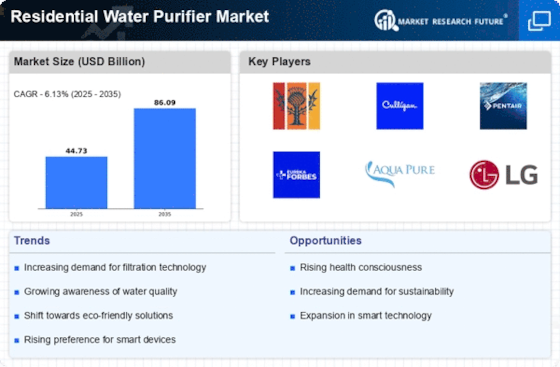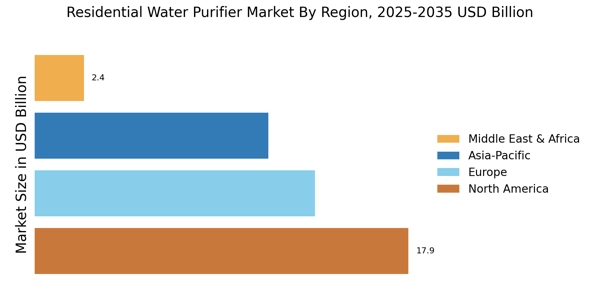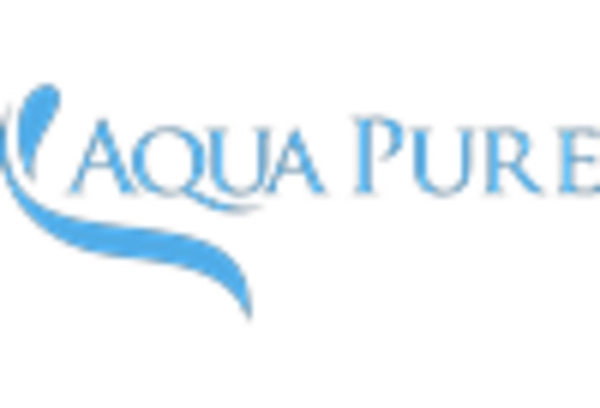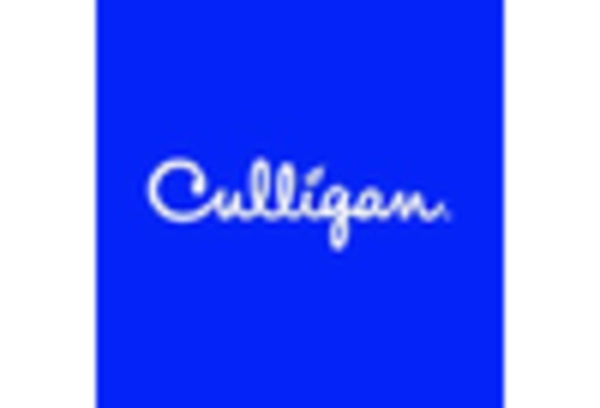Regulatory Standards and Compliance
Regulatory standards and compliance requirements are increasingly influencing the residential water purifier Market. Governments and health organizations are establishing stringent guidelines to ensure safe drinking water, which in turn drives the demand for certified water purification systems. Compliance with these regulations is essential for manufacturers, as non-compliance can lead to significant penalties and loss of market share. As a result, companies are investing in research and development to meet these standards, thereby enhancing product quality. The Residential Water Purifier Market is thus experiencing growth as consumers seek products that not only comply with regulations but also offer superior purification capabilities.
Health Awareness and Safety Concerns
The increasing awareness regarding health and safety is a primary driver for the Residential Water Purifier Market. Consumers are becoming more conscious of the quality of water they consume, leading to a surge in demand for water purification solutions. Reports indicate that approximately 70% of households are now prioritizing water quality, reflecting a shift in consumer behavior. This heightened focus on health is further fueled by concerns over contaminants such as lead, chlorine, and bacteria, which can adversely affect health. As a result, manufacturers are innovating to provide advanced filtration technologies that ensure safe drinking water. The Residential Water Purifier Market is thus witnessing a robust growth trajectory, as consumers increasingly seek reliable purification systems to safeguard their health.
Technological Advancements in Filtration
Technological advancements play a crucial role in shaping the Residential Water Purifier Market. Innovations in filtration technologies, such as reverse osmosis, UV purification, and activated carbon filters, are enhancing the efficiency and effectiveness of water purifiers. These advancements not only improve the quality of purified water but also cater to diverse consumer needs. For instance, the introduction of smart water purifiers equipped with IoT capabilities allows users to monitor water quality in real-time. Market data suggests that the adoption of such technologies is expected to increase by 25% over the next five years. Consequently, the Residential Water Purifier Market is evolving rapidly, driven by the demand for more sophisticated and user-friendly purification solutions.
Environmental Concerns and Sustainability
Environmental concerns and the push for sustainability are driving changes in the Residential Water Purifier Market. Consumers are becoming more environmentally conscious, seeking products that minimize waste and reduce their carbon footprint. Water purifiers that utilize eco-friendly materials and energy-efficient technologies are gaining popularity. Additionally, the trend towards reducing single-use plastic bottles is prompting households to invest in water purification systems as a sustainable alternative. Market data suggests that the demand for eco-friendly water purifiers is expected to grow by 40% in the coming years. This shift towards sustainability is reshaping the Residential Water Purifier Market, as manufacturers adapt to meet the evolving preferences of environmentally aware consumers.
Rising Urbanization and Population Growth
Rising urbanization and population growth are significant factors propelling the Residential Water Purifier Market. As more individuals migrate to urban areas, the demand for clean and safe drinking water intensifies. Urban centers often face challenges related to water quality due to aging infrastructure and pollution. Consequently, households are increasingly turning to water purifiers as a reliable solution to ensure access to safe drinking water. Market analysis indicates that urban areas are projected to witness a 30% increase in water purifier adoption over the next decade. This trend underscores the critical role of water purifiers in addressing the needs of growing urban populations within the Residential Water Purifier Market.

















